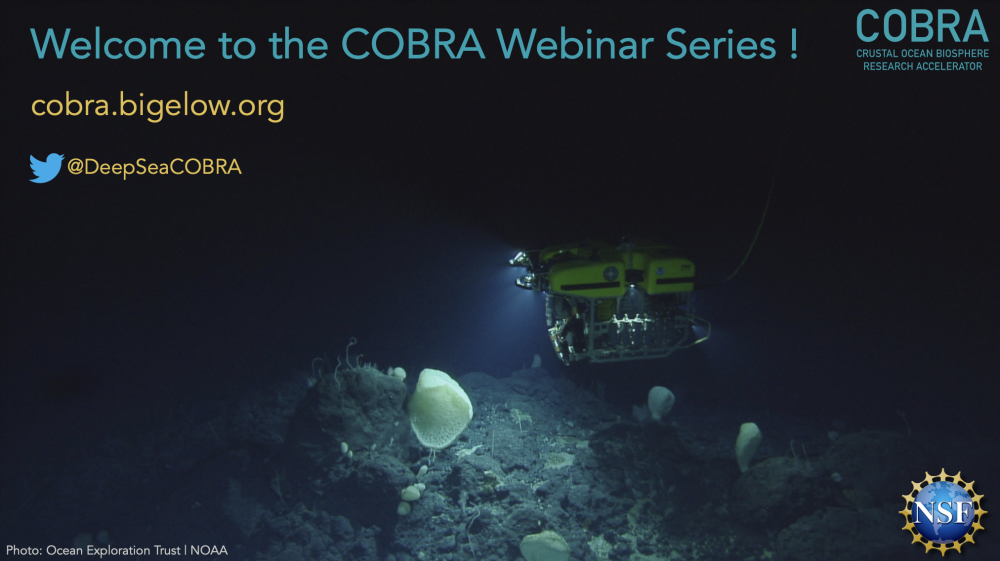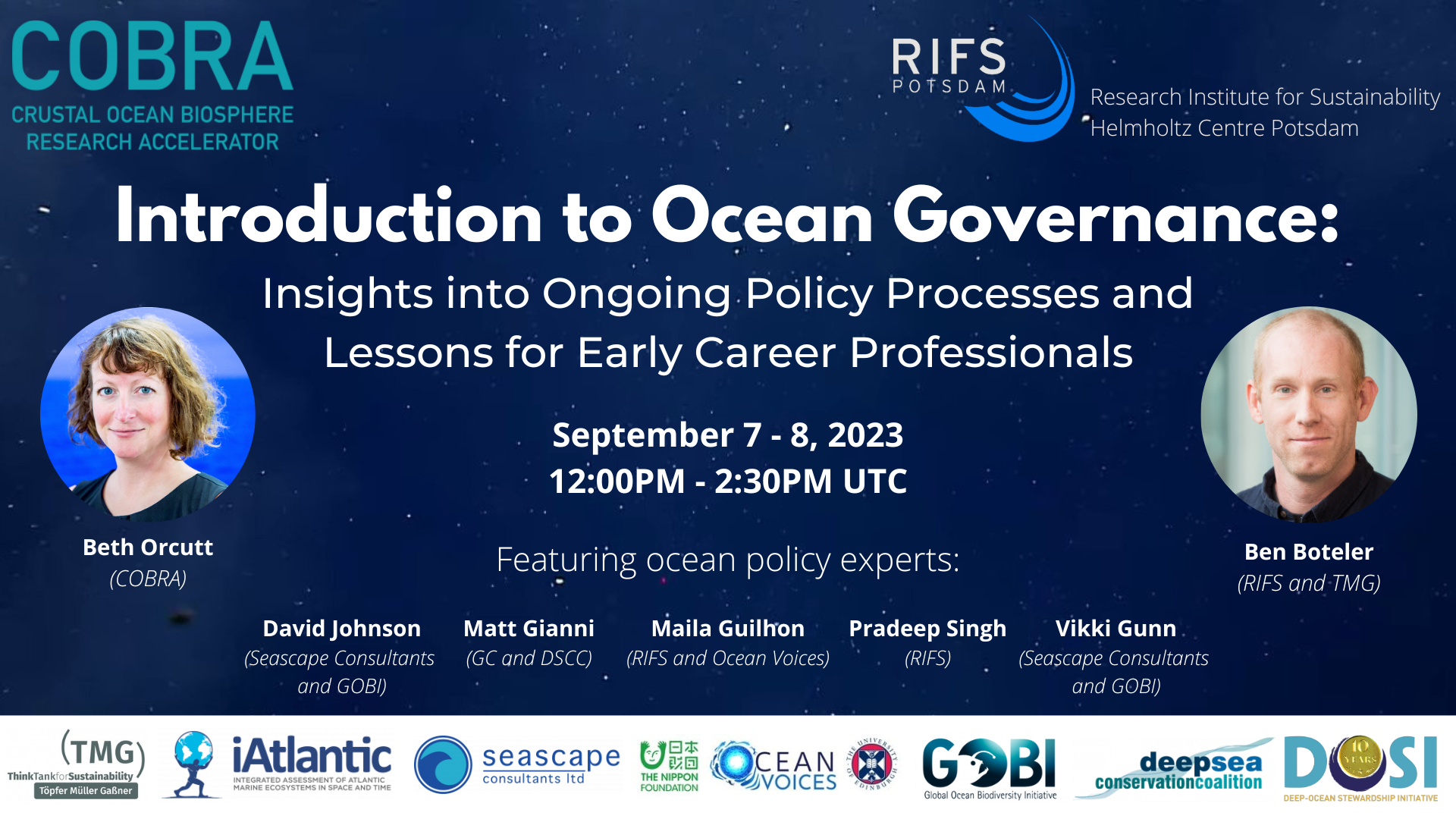Monthly Webinar Series
We bring the COBRA community together through this monthly webinar series. These virtual events will be held on the first Tuesday of each month at 3:00 – 4:30PM Eastern Time, with a regular rotation of science and professional development topics. Each workshop contains 90 minutes of programming, including a short community building ice breaker, invited speaker plenary tutorials and presentations, and plenary Q&A sessions. To foster an open environment for discussion, only presentations and Q&A may be recorded. Please let us know your suggestions for speakers/topics for future COBRA webinars here!
NEXT WEBINAR:
May 6, 2025 (3:00 – 4:30PM EDT, UTC-4)
Prof. Andrew K. Sweetman (Scottish Association for Marine Science)
Upcoming Webinars
June 3, 2025 (3:00 – 4:30PM EDT, UTC-4)
Seafloor Mapping
Dr. Vicki Ferrini (Lamont-Doherty Earth Observatory)
Previous Webinars
April 7, 2025
Monitoring & Evaluating Deep Sea Capacity Development Initiatives
Katy Croff Bell (Founder & President, Ocean Discovery League), Susan Poulton (Vice President of Strategy and Communications, Ocean Discovery League), and Nadiah Rosli (Capacity Development Program Manager, Ocean Discovery League)
March 3, 2025
Conservation and restoration at nodule fields and hydrothermal vents
Dr. Sabine Gollner (NIOZ, Royal Netherlands Institute for Sea Research)
January 7, 2025
Deep-Sea Conservation
Matthew Gianni (Co-Founder of the Deep-sea Conservation Coalition), Haydée Rodriguez (Coral Reefs of the High Seas Coalition) and Randi Rotjan (Boston University)
December 3, 2024
Critical Minerals Research at BOEM
Dr. Brad Blythe (Bureau of Ocean Energy Management)
November 12, 2024
Ocean Exploration Opportunities with Schmidt Ocean Institute
Leonard Pace (Science Program Senior Manager at the Schmidt Ocean Institute)
October 1, 2024
Deep-sea discoveries from early career researchers (Part 2)
Dr. Kristen Johannes (Ocean Discovery League/Scripps Institution of Oceanography) and Dr. Johanna Weston (Woods Hole Oceanographic Institution)
September 3, 2024
Deep-sea discoveries from early career researchers
Dr. Steve Auscavitch (National Museum of Natural History, Smithsonian Institution) and Beatriz Naranjo-Elizondo (Pelagos Okéanos & Universidad de Costa Rica)
July 2, 2024
Baselines, thresholds of harm, and monitoring strategies for microbial ecosystem services that could be impacted by deep-sea mining
Dr. Beth Orcutt (Bigelow Laboratory for Ocean Sciences and Associate Director of COBRA) and Dr. Julie Huber (Woods Hole Oceanographic Institution and Director of COBRA)
June 4, 2024
Challenger 150: what is it, what has it done, and what can it do for you?
Dr. Kerry Howell (University of Plymouth)
May 6, 2024
“Was not expecting that” and other lessons learnt from the NorthEast Pacific Deep-sea Exploration Project (NEPDEP)
Dr. Cherisse Du Preez (Head of the Deep-sea Ecology Program, Fisheries and Oceans Canada, Adjunct at the University of Victoria, and Co-founder and Lead of NEPDEP)
April 1, 2024
Deep-Sea Research in Costa Rica: The Importance of International Collaboration
Dr. Jorge Cortés (Centro de Investigación en Ciencias del Mar y Limnología (CIMAR) & Escuela de Biología, Universidad de Costa Rica)
March 4, 2024
Ocean Exploration Opportunities with Ocean Exploration Trust and Schmidt Ocean Institute
Dr. Dan Wagner (Chief Scientist at the Ocean Exploration Trust) and Leonard Pace (Science Program Senior Manager at the Schmidt Ocean Institute)
January 9, 2024
Microbial reactivity associated with subsurface geoengineering
Dr. Benedicte MENEZ (Institut de physique du globe de Paris – Université Paris Cité France)
December 5, 2023
What do we really know about deep ocean critical minerals?
Dr. Amy Gartman (US Geological Survey)
November 7, 2023
The Status of Deep-Sea Mining in Norway
Dr. Steffen Leth Jørgensen, Dr. Pedro A. Ribeiro, and Dr. Eoghan P. Reeves (University of Bergen)
September 7-8, 2023
Special Event – Two Day Short Course (Virtual)
Introduction to Ocean Governance: Insights into Ongoing Policy Process and Lessons for Early Career Professionals
Co-hosted by: Dr. Beth Orcutt (Bigelow Laboratory for Ocean Sciences and Associate Director of COBRA) and Dr. Ben Boteler (Research Institute for Sustainability (RIFS) in Potsdam and TMG Think Tank for Sustainability)
August 10, 2023
Update on deep-sea mining negotiations and addressing knowledge gaps for developing robust baselines, thresholds, and monitoring for protection of the marine environment
Dr. Beth Orcutt (Bigelow Laboratory for Ocean Sciences and Associate Director of COBRA) and Dr. Diva Amon (Director of SpeSeas)
July 11, 2023
Perspectives on the Deep Ocean in Global Climate Negotiations and Ocean CDR Strategies
Dr. Sarah Seabrook (NIWA, New Zealand)
June 6, 2023
A Future for Carbon Dioxide Removal below the Deep Sea
Dr. Martin Scherwath (Ocean Networks Canada and SolidCarbon)
May 2, 2023
What the UN’s High Seas Treaty Means for Deep-Sea Science
Dr. Jeff Marlow (Boston University)
Dr. Rebecca Helm (Georgetown University)
April 4, 2023
EMSO – Azores Observatory Science and Opportunities
Dr. Marjolaine Matabos (IFREMER, France)
March 10, 2023
The Status of Deep-Sea Mining
Dr. Diva Amon (Director of SpeSeas) and Hannah Lily (Independent Consultant – Ocean, Natural Resources, and Regulatory Law)
February 7, 2023
Ocean Exploration Opportunities with Schmidt Ocean Institute and Ocean Exploration Trust
Leonard Pace (SOI) and Dr. Dan Wagner (OET)
January 10, 2023
Impacts of Deep Seabed Mining – Results from Independent Scientific Monitoring
Dr. Matthias Haeckel (GEOMAR Helmholtz Centre for Ocean Research Kiel, Germany)
November 1, 2022
Deep-Sea Expedition Leadership Capacity Building with the COBRA Master Class
Dr. Beth Orcutt (Senior Research Scientist at the Bigelow Laboratory for Ocean Sciences and Director of COBRA)
About the COBRA Webinar Series
The layout of the 90-minute meetings (all 3:00 – 4:30PM Eastern Time on the first Tuesday of each month) is anticipated to be:
- Welcome (10 minutes)
- Community building ice breaker (10 minutes; in breakout rooms if the group is large)
- Plenary talk(s) (30 minutes)
- Open Q&A (30 minutes)
- Wrap up (10 minutes)
By registering for and attending the meeting, you agree to review and abide by our non-discriminatory Code of Ethics and Professional Conduct and Conflict of Interest Policy to treat everyone with dignity and respect and communicate with civility. The following behaviors are prohibited: harassment or threats in any form; any behavior that has the effect of creating an environment that is hostile towards a person or group; or taking videos or photos without prior consent. As a consequence of prohibited behaviors, meeting organizers may institute disciplinary actions, including immediate and permanent removal from the meeting. Please report any prohibited behavior to cobra@bigelow.org.



